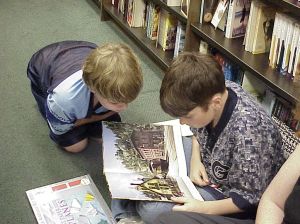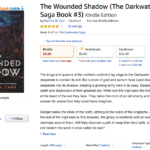Reading, Ratings, And Parental Guidance
 Last week someone on an email loop to which I subscribe put through a request for suggested book titles for her sixteen-year-old son. Because the boy’s interests include speculative fiction, one member of the loop recommended the Spec Faith library! Yea!! To be honest, this is one of the main reasons we’re compiling the list of books. We want readers who love the genre to discover novels written from a Christian worldview.
Last week someone on an email loop to which I subscribe put through a request for suggested book titles for her sixteen-year-old son. Because the boy’s interests include speculative fiction, one member of the loop recommended the Spec Faith library! Yea!! To be honest, this is one of the main reasons we’re compiling the list of books. We want readers who love the genre to discover novels written from a Christian worldview.
As I thought about this mom’s request, though, I was mindful of the fact that picking from the extensive list of books might still be hard. How does someone actually go about selecting books or recommending them or approving them for a child?
Recommending and approving, of course, can be taken care of if a person has first read the books themselves. That’s not possible at all times, however, and doesn’t come into play when trying to pick a book to read for him- or herself.
Once, certain publishers were considered “safe.” For example, several years ago when I would donate books I’d read to my church library, our former librarian would often ask who published them. Certain publishing houses were an automatic “yes.”
But things are changing, even for traditional Christian publishers. One such change is a swing toward “Christian worldview fiction” and the depiction of the dark things in the world as well as the light. Another is the emergence of a host of independent publishers along with an upsurge of self-published titles.
Some people have suggested rating systems to help readers navigate through the maze of available titles. One bookstore chain even tried such a thing for a short time, adding a “Read with Discernment” label to some of the titles they put on their shelves (see “To Label or Not to Label” at my own site for my reaction to this experiment).
That move proved to be controversial. Among other things, the bookstore chain was accused of being greedy–trying to placate their conservative core readership while selling books to a broader audience. I can’t speak to those accusations because I simply don’t know what motivated them to try such a thing or to quickly abandon it.
What I did then and do now believe about rating systems is that they deliver the job of discernment into the hands of someone removed from the consumer.
Movie ratings are often used as an example of what works when it comes to a quick and easy assessment of stories. However, I doubt seriously if any person Hollywood charges to rate a movie does so based on a Christian worldview. Instead, the focus is on external things–how much bad language, sex, or violence is in the movie. The amount of those things is then assigned to certain age groups–kids should be protected from it all, so G; teens should be protected from sex but not sexual innuendo and from graphic violence, so PG; and so forth.
Do Christian ratings do any better? One popular site, Plugged In (a part of Focus on the Family) reviewed the Pixar movie Brave based on Sexual Content, Violent Content, Crude and Profane Language, Drug and Alcohol Content, Other Negative Elements, and, yes, Spiritual Content.
In this latter section, the reviewer camps primarily on the use of magic with a mention of references to “destiny” or “fate.”
Where, I wonder, is the analysis of the movie from the position of what the Bible says about the theme elements? Does it depict women and relationships in a Biblical way? Aren’t those the important questions?
So here’s what I’m thinking. Any review or rating system is flawed. It is imperfect and incomplete because the reviewer is human and brings his or her own beliefs to the party.
I can read the Plugged In review, then, and clearly see that I haven’t been given enough information to know whether Brave is complementary to a Christian worldview or not. So what if there is no bad language or some implied drinking? Those things or lack thereof do not a Christian make.
So what if a couple of (cartoon) kids are shown running around (from behind) in their birthday suits and doing stunts and pranks that exasperate the adults who rarely reprimand them? Is a work “Christian” if it shows good parenting? Or perfectly behaving kids?
Some parents who want to impress upon their children some particular point, such as not doing silly, careless pranks (the kind that could lead to hazing) might want to know that a particular movie shows the very thing they are dealing with.
But should parents rely on the word of this reviewer to know without question that this movie, or any movie, is acceptable or not? I say, no. Reviews help a reader or movie-goer know the direction of the story, but they are starting places, and ought not be conclusions.
Rather, a parent’s job is to provide guidance. We seem to forget that the PG and PG-13 ratings mean precisely that. Parents should evaluate and discuss and guide, not assume, based on someone else’s rating.
So too with reviews here at the Spec Faith library. No reviewer is perfect or has the same life experience as all other readers. Consequently there are no perfect reviews–merely opinions by other readers. Some might prove reliable and insightful, others, not so much.
Readers, like movie-goers, learn to trust the reviewers who are more nearly like-minded. In this day of Amazon reviews, we also learn to trust either the majority of reviewers who concur, or the dissenting voices who give reasoned opinions that square with our own thinking.
In either case, reviews seem to rule the day (and the more, the better, I say). I consider them to be superior to ratings and less likely to create a new gatekeeper (the previous one being traditional publishing houses and/or bookstores). But nothing should replace good old fashion discernment on our part. After all, we will be the ones God holds accountable for our thoughts and attitudes, not any ratings maker.









































So right! Case in point: My Brother and I like the Justice League, so when Warner Bros. put out an animated movie about the JL we wanted to see it. My brother bought the PG-13 (for action violence) rated film and we watched it. GOOD GRIEF. There where curse words (not super bad ones) every five feet and buckets of animated blood (not to mention the Flash was played by Neil Patrick Harris-’nuff said). Totally NOT what was expected. We turned it in for cash soon afterwards. That is my take on the PG-13 debate. I would like to see a rating between PG-13 and R something like PG-16, that would solve many problems right there.
If that’s the old-style Justice League movie, set in the 1950s with the giant space-being that spawns (why not?) dinosaurs, I found that one okay. I don’t recall “buckets” of blood, but of course there was more blood and overt violence than in the fun Justice League (and Justice League Unlimited) animated series, and their Timm-produced predecessors (Batman: … and Superman: The Animated Series).
As for Neil Patrick Harris, though, I’m curious how that would have been a bother — other than the fact than The Flash should always be voiced by Michael “I had dinner with two women at the same time! ’cause I’m a stud!” Rosenbaum. (Or perhaps the fact that Harris is homosexual, but that shouldn’t have ruined the character any more than overt homosexual/anti-God Ian McKellen ruined Gandalf or Liam “Aslan could actually be Muhammad if you try hard enough” Neeson ruined The Lion.)
Anyway, this goes to illustrate how discerning one’s own age, maturity level, and personal temptation levels are also essential to media discernment.
Yep that’s the one! I have no problem with Harris as a talent, he was a fine Flash, it was just fair warning. I wasn’t expecting some of the stuff that was in that film, that was all. I ASSUMED that it being animated (thus attractive to children) that WB would’ve toned it down some, but I was wrong. I have learned to be really careful about any kind of media that I choose to watch, read, etc. I have a real problem with swearing (Yeah, it’s a part of life, but it bugs me) and that is really what ruined that particular JL movie for me, I can deal with blood and guts, but swearing in an Animated format gets on my nerves.
That’s the issue. You assumed that because it was animated, that it was suitable for children. I don’t know anything about ‘buckets of blood’ but the movie was designed for teenagers and possibly adults and the DVD was rated accordingly (M in Australia for moderate themes and moderate violence).
I look up ratings (and more so, reviews) so I can have some idea of what’s in a TV show before I watch it and not be blindsided. At the same time, I’m learning to exercise my own discretion as led by the Lord.
Galadriel, I think that’s the goal. I believe in reviews–that helps us get started. From that point, though, it’s up to us to develop discernment so we’re making choices not because someone else told us this book was or wasn’t OK, but because we saw for ourselves how it squares with the Bible.
I’ve said before, and probably here at Spec Faith, that the problem isn’t reading or viewing something from another worldview. It’s doing so and not recognizing it. When we read a book that espouses something contrary to Scripture and don’t recognize it as a lie, then we are susceptible to that lie.
Eve is a good example. If she had only called Satan on his lie, she would not have considered eating of the forbidden tree, no matter how long he kept after her. A lie repeated is still a lie, as long as we know it as such. I don’t care how many times, for example, atheists say there is no God. Their repeating it has no influence on me because I know it isn’t true.
On the other hand, when we don’t think about what we’re reading, the lies can slip in unchallenged, and those just might undermine our beliefs.
Becky
I like this
I agree that tick-box ratings can be very unhelpful. I remember watching a drama on the BBC, which warned, as they always do beforehand, that it contained ‘language which might offend.’ I think this consisted of one, or perhaps two, f-words – one of which, in the context, was a very understandable reaction.
What to me was far, far more offensive, however, was that the romance we were supposed to be rooting for, and the success of which constituted the happy ending, was essentially adulterous. That evidently isn’t on the BBC’s tick-box of offensive things…
Actually, I think Plugged-in does pretty well. They enumerate so many seemingly minor things, because they want parents to make up their own minds. For example, they don’t decide that hobbits smoking is so bad that no Christian should see the movie, or so unimportant that it’s not worth mentioning at all. It doesn’t bother me, but some Christians might have a real problem with it.
And they certainly do comment on themes as well. We might not always agree with their conclusions of course, and yes, they probably do strain out gnats and swallow camels sometimes. But it’s far better than a ratings-based system, or ‘trust me to decide for you’ type approach. And it’s certainly better than depending on secular film reviews, which are likely to strain out the kosher stuff and swallow dung.
Kirsty, thanks for your input about Plugged In. I wasn’t trying to single them out, but I had noticed the gnat and camel issue. 😉 I think we really have that backwards in our reactions to books and movies, and I see the idea of ratings as threat to increase straining out the wrong thing.
My classic example which I’ve used here at Spec Faith before is the “sweet movie” The Lion King which so many Christians love. While it is clean and wholesome, it is filled with Eastern mystical religious references and anti-Christian thinking.
If we weren’t so conscious of protecting our children from hearing curse words, we might actually notice that they are being exposed to a false worldview.
Mind you, I don’t want to read profanity or vulgarity, but I don’t see language as being the basis of rating a work as acceptable or unacceptable. If it comes down to a clean story that has the characters kill God in the end, or a story that has some cursing and a character that finds redemption in Jesus Christ, well, I don’t think there should be any question which is the story that is God-glorifying. Yet rating systems based on language would reverse that.
Obviously that’s an extreme example to make the point.
And yes, I was glad that Plugged In didn’t give a categorical recommendation. I think parents need to be discerning about the stories they allow or recommend for their children, and we adults need to do the same for our own reading.
Reviews make that possible, I think, which is why I want to see more of them here at Spec Faith.
Becky
Plugged In Online is decent but Christian Spotlight is too much. They seem to grade everything as if it should be suitable for the youngest of children.
Hmmm, I’m not familiar with Christian Spotlight. I’ll have to take a look. Thanks for pointing us to them … or warning us away from them … 😉
Becky
I’ve noticed that about some Christian review mindsets. They act as if movies and stories are, or should be, only for children, and that adults have somehow Arrived at a point beyond discernment or enjoyment of stories. My question, of course, is where in the world did we get the idea that people can move from the status of being children, hearing listen to your parents, to being parents themselves, saying children listen to me? What comes in between? Christian teachers often drop the ball on this one.
Here’s hoping Speculative Faith, with Jared Moore’s Teaching Story Transitions series, can pick it up.
I’ve noticed that too. I’ve been introducing my elementary-age brother into Doctor Who, and he’s eagerly devoured my new Season Six box-set. I watched most of them with him, but gave him strict instructions against Closing Time (homosexual innuendos ) and wavered about the premise of God Complex, but figured the latter was too deep to really affect him much. But I noticed the use of words like “God” and “hell” a lot more when I was watching with him…kind of exasperating, but to be expected. But I’m trying to be careful there, because he is younger than me and shouldn’t be watching some of that.
Great point, Stephen. I think it’s a mistake for parents to dictate to their kids rather than help them work through their own values. Otherwise, as you hear happening so often, those kids go off to college and dive into the deep end. They don’t have their parents there saying no any more, and they haven’t figured out what they believe.
Reading is such a great way to help kids figure out what is right and wrong and what their own choices should look like.
Instead we want to slap PG ratings on things and tell twelve year olds it’s therefore “safe” for them to read.
Becky
I do wish there was some kind of rating system for books, like there are for movies and videogames. I could pick up and book and go, “This has a cool cover. It has an interesting story. Wait, the rating says it has gay rape and bestiality? No thanks!”
Instead, that’s the kind of thing I get to find out. By surprise. As I read. Only later do I check Amazon and read the reviews by people gnashing their teeth at the filth in the book.
Sure, ratings are flawed. But they can serve as red flags!
Ugh! I’m with you Kessie! I hate picking up a book and finding that kind of stuff in it 🙁
One of the fanfic sites I read has warnings for things like explicit sex, explicit violence, swearing, non-consensual sex, etc, as well as ratings (adult, teen, all ages) and category labels that include femslash, slash, etc. I appreciate the warnings because it makes it easier to know why it’s labeled that way, especially if the author didn’t mention it in the summery.
I’m with you, Becky. I read the reviews and I don’t care about about rating system because the rating system doesn’t tell me about the things I care most about.
Thanks! Great post.
Interesting what Plugged In had to say about Brave. I saw it and when you put some of that stuff into context, it wasn’t bad. But when you fill in each category, highlighting every bad scene or drink or word, then yeah, it writes off like a bad movie.
I realized that the same list could also be used of my own book. If someone were to write about each category, it would be filled with stuff in the Sexual Content, Violent Content, Crude and Profane Language, Drug and Alcohol Content, Other Negative Elements, and Spiritual Content. But if you read the book as a whole, you realize how each part fits in.
I remember reading a review for Karen Hancock’s Light of Eidon that talked about the pre-marital sex in the book. No context was given. When I saw the review, I assumed it was a bad scene and chose not to read the books. It wasn’t until years later I finally read the book and realized the lady had not given the big picture. It wasn’t gratuitous or tacked on. And it wasn’t shown.
Context is just as important as the elements in a book. Labels don’t show this, and sometimes reviews don’t either.
Perfect illustration of what I’m saying, Morgan. Interestingly, I just wrote a comment on another site to the effect that a story that doesn’t show sin is actually not truthful because we all sin and come short of the glory of God. So a story that sanitizes all the things that sites like Plugged In flag is actually less truthful than stories like yours that show the depravity of man.
Becky
This makes me want to sigh. I’m not sure why Christians, with all their emphasis on truth, can be so careless about things sometimes. I do not claim to be above this myself, of course, but God is a God of truth. (With some secular books like Harry Potter, Christians even repeat overt lies about the stories, and condemn the supposed intrinsically harmful “magic” in them while giving, say, Star Wars a complete pass.)
Here’s a hint about story reviewing: If a similar review of the Bible itself, using the same reading methods and reviewing intent, would result in concluding that its content is harmful and should not be read, then the reviewing style and motive is flawed and shallow.
I was warned about The Light of Eidon too. I read it anyway and was a little surprised but when I read the second book in the series I saw how it all fit and what Karen actually did with the “offending” parts. As I’ve said here and at another site having a similar discussion, stories that don’t show sin are untruthful. Sin is part of our condition, so why are we focused on censoring or warning people away from stories that include it?
If the point is to titillate or to create vulgar humor or to dwell on what is crude or damaging or vile, then I’d want to know and would choose to stay away from those books. That’s the standard God has impressed on me. So I pay attention to reviews of books or movies (or trailers) that sound good because I want to know if I might enjoy them or not.
That, in my opinion, is what reviews should do–not replace my own judgment.
Becky
I personally take PluggedIn and sites like it with a grain of salt. There seem to be very few movies which they actually approve of (if you read their ‘conclusion’ at the bottom of the review) and the long list of out of context objectional content can be daunting. So I’ll skim it just to check if there’s a scene that I’ll want to skip b/c I’m squeamish, etc.
I’ve always sort of wished for some kind of content advisory for books, but never that strict. I appreciate the ratings on my fanfic sites, like Galadriel said. Just hits on the basics, and it’s author-rated.
But ultimately I hit GoodReads before I read most books. So many good reviews.